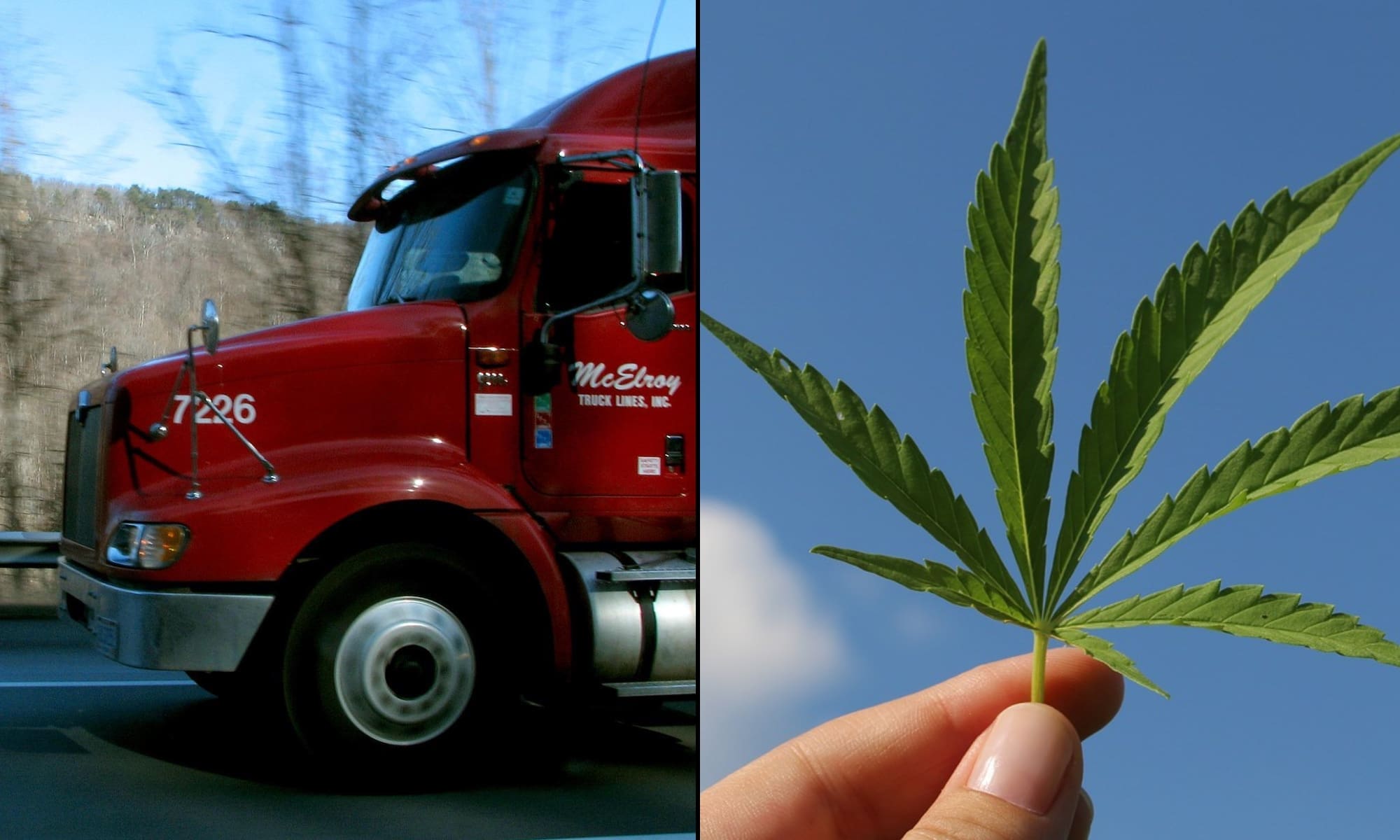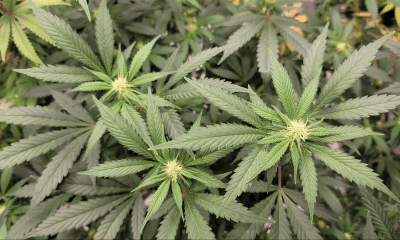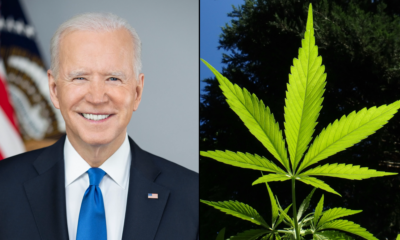Politics
Marijuana Rescheduling Won’t Affect Drug Testing For Truckers, Transportation Secretary Buttigieg Says

U.S. Transportation Secretary Pete Buttigieg says that moving cannabis to Schedule III of the federal Controlled Substances Act wouldn’t affect drug testing policies for commercial truckers, noting that the Department of Transportation (DOT) specifically lists marijuana as substance to screen for.
“Our understanding of the rescheduling of marijuana from Schedule I to schedule III is that it would not alter DOT’s marijuana testing requirements with respect to the regulated community,” he said at a congressional hearing on Thursday. “For private individuals who are performing safety-sensitive functions subject to drug testing, marijuana is identified by name, not by reference to one of those classes. So even if it moves in its classification, we do not believe that that would have a direct impact on that authority.”
Buttigieg was responding to a question from Rep. Rick Crawford (R-AR) during a House Committee on Transportation and Infrastructure hearing on Thursday. The congressman had referenced concerns from the American Trucking Associations (ATA) “about the broad public health and safety consequences of reclassification on the national highway system and its users,” which ATA voiced in a recent letter to Buttigieg.
“The rescheduling and deregulation of marijuana would inevitably cause a number of people driving impaired while high to grow,” Crawford said. “Can you speak to what your department’s doing to ensure that transportation workers and safety reliant positions can continue to be tested for marijuana use if this proposal goes forward and how your department plans to address transportation safety in light of DOJ rulemaking?”
Buttigieg replied that “any impaired driving—via alcohol, marijuana or any other source of impairment—is, of course, a major safety concern.”
While the transportation continued that DOT is “continuing to evaluate any indirect impact” of rescheduling, he said the agency doesn’t expect “any drug testing requirement relevant to that to be changed based on the reclassification decision.”
“Likewise, I should mention for federal employees, including any DOT employees who have a security clearance or safety-sensitive position, we do not understand that to be changed,” Buttigieg said.
It’s not immediately clear which other federal employees would still be required to be tested for marijuana use if rescheduling goes through. While Buttigieg is correct that drivers are required to be tested for a panel of drugs, including marijuana, federal employees are subject to both blanket workforce policies and agency-specific ones.
As it stands, the use of Schedule I and Schedule II drugs by federal government workers is prohibited under a 1986 executive order from then-President Ronald Reagan that established the Federal Drug-Free Workplace program. While individual agencies have adopted their own policies regarding drug use, many are rooted in the Reagan order.
Because that order defines “illegal drugs” as only those in Schedules I and II, some attorneys believe rescheduling to Schedule III could lift marijuana restrictions that currently apply to all federal workers.
Later in Thursday’s hearing, Rep. Michael Bost (R-IL) also pressed Buttigieg on the impact of marijuana rescheduling on drug testing for truckers, school bus drivers, subway operators and other federally regulated transportation workers.
“Our commitment to that testing continues regardless of the schedule, and we believe our authorities are intact too, because they don’t call for testing by reference to where marijuana sits in its classification, but rather, it’s specifically named,” Buttigieg responded. “So whether we’re talking about the regulated community, those drivers you were talking about, or whether we’re talking about our own personnel, somebody with a security clearance or somebody in a tower, our understanding is, at this time, is that nothing about that reclassification would change our practices.”
Bost then pointed out that marijuana metabolites are detectable in a person’s system days after they are no longer impaired.
“Right now, when we have a driver shortage, you can have a beer on Sunday and you’re not impaired to drive on Monday. Now you can smoke a joint on Friday. You may not be impaired, but it’s going to show up in that test and it’ll show up for 30 days,” he said. “Something’s got to be figured out, as far as that’s concerned, if we’re going to continue down this path.”
“It makes it very difficult as a truck owner and a business owner to find the employees that aren’t spending their time smoking dope in their parents basement, and we’re concerned about having a job, and we’ve got to figure this out,” the congressman said. “And I hope that you’ll continue to work on that, to make sure that not only it’s safe, but that we can also have drivers and figure out how we’re going to do this, and we’re going to continue down this path.”
Buttigieg replied simply that he “agreed” with Bost’s point.
Chris Spear, ATA’s CEO, said he appreciated the exchange between Crawford and Buttigieg.
“We are grateful to Congressman Crawford for elevating this serious issue, and we appreciate Secretary Buttigieg’s focus on providing the transportation industry with the clarity it needs to continue screening for marijuana use among safety-sensitive transportation workers,” Spear said in a statement. “If the trucking industry’s ability to conduct drug testing for marijuana use were to be restricted, a heightened risk of impaired drivers would threaten our nation’s roadways. DOT and ATA share the goals of achieving zero highway fatalities and ensuring the commercial driving workforce is qualified to safely operate, which is why we are committed to partnering with DOT to mitigate harmful impacts caused by the potential reclassification of marijuana.”
Notably, Crawford highlighted during the meeting that he sponsored legislation that would allow truck drivers to be tested for cannabis use through the use of a hair sample. That process is designed to detect drug use from weeks or even months earlier and cannot indicate whether someone is currently impaired.
The ATA letter to Buttigieg was “part of an ongoing effort to raise the alarm” about the proposal to move marijuana from Schedule I to Schedule III of the Controlled Substances Act (CSA), the group said in an earlier press release. “This major policy shift could have significant negative consequences for highway safety, endangering all who share the road.”
ATA said it intended to engage the Department of Justice (DOJ), the Department of Health and Human Services (HHS) “and other federal partners to ensure that any change in the law regarding the status and legality of marijuana use is accompanied by an explicit allowance for the testing of marijuana use by DOT-regulated safety-sensitive workers.”
But while the trucking industry is raising the alarm, truckers themselves apparently feel differently about the proposed policy shift. As part of an ongoing public comment period around rescheduling, some commercial drivers have weighed in to defend rescheduling.
Comments from truckers overwhelmingly favor the change, though at least some appeared to believe rescheduling would indeed allow them to use medical marijuana while away from work.
“As a truck driver in the United States I would like to be able to use marijuana on my time off,” one said in a submitted comment. “I believe it is unfair that I can lose my job and my license if I have used marijuana and a month later I can still lose my job if I come out ‘dirty’ in a random drug test. The statistics are there and proven that alcohol is the leading cause of death in car accidents compared to nearly zero percent with marijuana.”
Another trucker, who also claimed to be a driving instructor, pushed back on the notion that the regulatory change would signal to drivers that it’s OK to consume before a shift.
“I would expect my drivers to not drink alcohol at work, take NyQuil before a shift or a prescription that would interfere with driving, or get behind the wheel with lack of sleep,” the commenter wrote, “and the same would apply to those who take cannabis.”
As more states legalize marijuana, a federal report published earlier this year showed that the number of positive drug tests among commercial drivers fell in 2023 compared to the year before, dropping from 57,597 in 2022 to 54,464 in last year. At the same time, however, the number of drivers who refused to be screened at all also increased by 39 percent.
Another question found that 65.4 percent of motor carriers believed current marijuana testing procedures should be replaced with methods that measure active impairment.
At the time, the report from the American Transportation Research Institute (ATRI) noted a 65,000-driver deficit in the country and said the fear of positives over marijuana metabolites—which can remain in a person’s blood far long after active impairment—may be keeping would-be drivers out of the industry.
The record-high number of refusals came as the transportation industry faces a nationwide shortage of drivers, which some trade groups have said has only been made worse by drug testing policies that risk flagging drivers even when they’re not impaired on the job.
Current federal law mandates that commercial drivers abstain from cannabis, subjecting them to various forms of drug screening, from pre-employment to randomized testing.
In June of last year, meanwhile, a American Transportation Research Institute (ATRI) survey of licensed U.S. truck drivers found that 72.4 percent supported “loosening” cannabis laws and testing policies. Another 66.5 percent said that marijuana should be federally legalized.
Cannabis reform advocates, meanwhile, have also called on federal officials to change what they call “discriminatory” drug testing practices around the trucking industry.
“Tens of thousands of workers are leaving the commercial trucking industry because the federal government refuses to update its antiquated marijuana policies,” Paul Armentano, deputy director of NORML, wrote in a Marijuana Moment op-ed earlier this year. “Fewer truckers on the road results in supply chain shortages and higher prices for the goods Americans rely on.”
A top Wells Fargo analyst said in 2022 that there’s one main reason for rising costs and worker shortages in the transportation sector: federal marijuana criminalization and resulting drug testing mandates that persist even as more states enact legalization.
Rep. Earl Blumenauer (D-OR) sent a letter to the head of DOT in 2022, emphasizing that the agency’s policies on drug testing truckers and other commercial drivers for marijuana are unnecessarily costing people their jobs and contributing to supply chain issues.
Last year’s ATRI report noted that research into the impact of cannabis use on driving and highway safety is currently mixed, complicating rulemaking to address the issue. A separate 2019 report from the Congressional Research Service (CRS) similarly found that evidence about cannabis’s ability to impair driving is inconclusive.
Also last year, DOT finalized a rule permitting another alternative option to screening urine samples: saliva-based testing. Depending on frequency of use, THC is generally detectable in saliva anywhere from one to 24 hours after use, according to the agency.
In 2022, meanwhile, DOT proposed guidance warning commercial drivers who use CBD products that they are doing so “at their own risk.”
A newsletter from DOT’s Federal Transit Administration (FTA) published that same year included two sections on cannabis issues: one that again reminded employees that they’re barred from using marijuana and another that similarly warned that CBD products remain unregulated and could contain THC levels that are detectable in a drug test.
Meanwhile the head of ATA told Congress a year ago that the state–federal marijuana policy conflict is creating a “litigious environment” for the trucking industry, contributing to the challenge of the labor shortage.
“Want to smoke weed at home? Smoke weed at home. If it’s legal, fine,” ATA President Spear said at the time. “Do not get behind the wheel of an 80,000-pound vehicle. We need to have strong standards, and we need to enforce the law.”
















